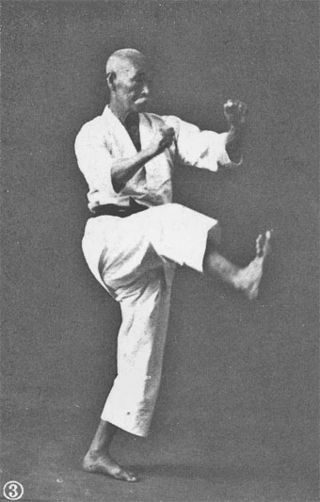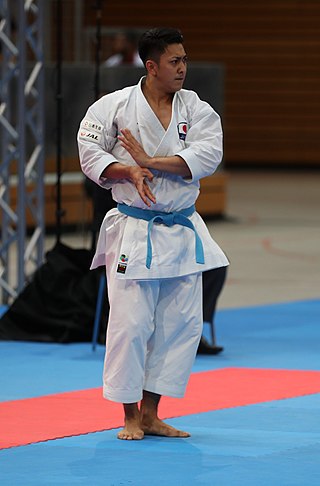
Karate (空手), also karate-do, is a martial art developed in the Ryukyu Kingdom. It developed from the indigenous Ryukyuan martial arts under the influence of Chinese martial arts. While modern karate is primarily a striking art that uses punches and kicks, traditional karate training also employs throwing and joint locking techniques. A karate practitioner is called a karate-ka (空手家).

Malaysia competed in the 2006 Asian Games in Doha, Qatar. The country was represented by 244 athletes competing in 23 of the 39 sports provided. Among the popular sports were aquatics, athletics, badminton, bodybuilding, bowling, cycling, hockey, football, golf, gymnastics, kabaddi, karate-do, sepak takraw, squash, table tennis, taekwondo, weightlifting and wushu. Athletes from Malaysia won overall 42 medals, and clinched the eleventh spot in the medal table. Abdullah Sani Karim was the chief of the delegation.
Yun Ok-hee is a South Korean archer, who won the gold medal in the team and a silver in the individual competition at the 2006 Asian Games and is a former world number one.

Antonio José Díaz Fernández is a Venezuelan karateka. He is best known for winning gold medals in kata at the World Championships in Serbia (2010) and France (2012), winning of the World Games in Cali, Colombia (2013), and Duisburg, Germany (2015), and a silver medal in the World Championships in Japan 2008. He won bronze medals at the WKF World Championships in karate in 2002, 2004, 2006, 2014, and 2016 in the men's individual kata. He has also won 23 Pan American Karate Federation Senior Championships Medals 23 times to date.

South Korea, officially the Republic of Korea, competed at the 2016 Summer Olympics in Rio de Janeiro, Brazil, from 5 to 21 August 2016. This was the nation's seventeenth appearance at the Olympics. The Korean Olympic Committee sent the nation's smallest ever delegation to the Games in Olympic history since 1984. A total of 205 athletes, 103 men and 101 women, competed in 24 sports.

South Korea competed at the 2014 Summer Youth Olympics, in Nanjing, China from 16 August to 28 August 2014.

Bimala Tamang is a (Nepalese) Nepali female karateka who recently won bronze for the Women's Individual Kata at the 2014 Asian Games in Incheon, South Korea. This was Nepal's first and only medal tallied at the 2014 Games.

Jun Woong-tae is a South Korean modern pentathlete.

Ali Sofuoğlu is a Turkish karateka competing in the kata. He is a member of Kağıthane Belediyesi S.K. In 2021, he won one of the bronze medals in the men's kata event at the 2020 Summer Olympics in Tokyo, Japan. He won the gold medal in the men's individual kata event at the 2023 World Karate Championships held in Budapest, Hungary.

South Korea participated in the 2018 Asian Games in Jakarta and Palembang, Indonesia from 18 August to 2 September 2018. It was the 18th appearance of the country at the Asian Games, except the first edition in Delhi. As one of the best competitors at the Games, South Korea's best achievement was in the 2002 Busan, with the acquisition of 96 gold, 80 silver and 84 bronze medals. At the latest edition in 2014 Incheon, the country had collected 79 gold, 71 silver, and 84 bronze medals.
Wang Yi-ta is a Taiwanese karateka.
Sakura Kokumai is an American karateka. She won the gold medal in the women's individual kata event at the 2019 Pan American Games in Lima, Peru and the 2023 Pan American Games in Santiago, Chile. She represented the United States in the women's kata event at the 2020 Summer Olympics in Tokyo, Japan.

Kiyou Shimizu is a Japanese karateka competing in the women's kata event. She won the silver medal in the women's kata event at the 2020 Summer Olympics in Tokyo, Japan. Shimizu is also a two-time gold medalist at the World Karate Championships and a three-time gold medalist at the Asian Games.

Ryo Kiyuna is an Okinawan karateka. He won the gold medal in the men's kata event at the 2020 Summer Olympics in Tokyo, Japan. He is also a four-time gold medalist in the men's kata event at the World Karate Championships and a two-time gold medalist in the men's team kata event, alongside Arata Kinjo and Takuya Uemura. He has also won multiple gold medals in both the individual and team kata events at the Asian Karate Championships.
Yin Xiaoyan is a Chinese karateka. She won the silver medal in the women's 61 kg event at the 2020 Summer Olympics in Tokyo, Japan. At the 2018 World Karate Championships in Madrid, Spain, she won the silver medal in the women's kumite 61 kg event.
Grace Lau Mo-sheung is a Hong Kong karateka. She won bronze in the women's kata event at the 2020 Summer Olympics in Tokyo, Japan, becoming the first Hong Kong athlete to win an Olympic medal in karate. She is a three-time medallist in the women's individual kata event at the World Karate Championships. She is also a medallist in this event at the Asian Games and the World Beach Games. She is a six-time medalist, including gold, at the Asian Karate Championships.
Shahida Abbasi is a Pakistani karateka. She is the first Pakistani woman to compete internationally in kata.

Shin Yu-bin is a South Korean table tennis player.
Orencio James Virgil "OJ" De los Santos is a Filipino karate practitioner who competes in kata events. He has competed in the Asian Games and the Southeast Asian Games.
Park Tae-joon is a South Korean taekwondo athlete. He won a gold medal in his World Taekwondo Championships debut in the 2023 World Taekwondo Championships held in Baku, Azerbaijan.









